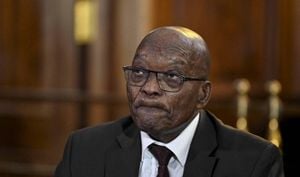Russia's nuclear posture has taken on new dimensions, raising concerns across the globe about the escalation of military tensions. Recently, President Vladimir Putin approved updates to the country's nuclear doctrine, which now includes conditions under which nuclear strikes can be authorized even against non-nuclear states. This strategic recalibration appears to be aimed primarily at sending signals to Western nations, particularly amid the backdrop of the conflict with Ukraine.
According to reports, the revised policy stipulates Russia's right to respond with nuclear weapons to aggressive acts by any state, irrespective of whether it possesses nuclear armaments itself. If this aggression receives support from nuclear states, even conventional military actions could potentially be interpreted as grounds for a nuclear response. Experts suggest the underlying implication of this shift is clear—if NATO, which includes nuclear-armed members like the United States and France, were to become involved, Russia might view any allied offensive against it as justification for nuclear retaliation.
Pavel Podvig, an expert on Russian nuclear forces, noted the significant changes to Russia's doctrine. Historically, the state's nuclear response was framed within the idea of deterring aggression primarily from nuclear powers, particularly those affiliated with NATO. He remarked, "A nuclear power was seen as the potential source of aggression... and its non-nuclear ally would be punished as well." This has now evolved as the language now reflects concerns about regional conflicts where NATO influences could entangle Russia.
The recent adjustments go beyond just redefined thresholds for using nuclear weapons. They expand the list of military threats considered sufficient for justifying nuclear action. Now included are military exercises near Russian borders and the potential deployment of air and space resources—like planes and missiles—over Russian territory. The text does not specify what constitutes a “critical threat,” leaving ample room for interpretation and potential miscalculations.
Podvig emphasized the vague reference to “critical” threats, which could include events like Ukraine's military actions close to Russia's territorial claims or even actions taken by the US. Such ambiguities naturally fuel worries about how the Kremlin might justify the use of nuclear capabilities, especially when it regards the status of annexed territories.
On the diplomatic front, Russia's recent military maneuvers have drawn direct responses from NATO and Western allies, who perceive the moves as provocative. Moscow has labeled the opening of military bases by the US and its allies as escalatory and destabilizing, prompting heightened discussions and alert levels within Europe. The recent naming of the US missile base at Redzikowo, Poland, as part of this tense narrative exemplifies the Kremlin's increasing readiness to point fingers when it feels threatened.
Maria Zakharova, speaking on behalf of Russia’s foreign ministry, articulated this stance, emphasizing the US base as part of “deeply destabilizing actions” threatening both regional security and strategic stability. She underscored this sentiment, stating, “This leads to undermining strategic stability, increasing strategic risks and, as a result, to an increase in the overall level of nuclear danger.”
Notably, as Putin addressed the nation about missile developments, he linked the advanced capabilities of Russia’s new missile systems directly to the threats posed by Western military support of Ukraine. He highlighted the capacity of new missiles to counter even sophisticated air defense systems employed by NATO forces, reaffirming the Kremlin’s resolve to defend its territories.
This progressively hostile rhetoric surrounding nuclear strategy raises substantial alarms among military analysts who warn of the possibility of misinterpretation of actions on both sides. With NATO's military presence intensified since the start of the Ukraine war, the fear among Western nations is not unfounded as they seek to counteract one more wave of aggression.
For now, the White House has remained cautious in its responses. Under Secretary for Political Affairs Victoria Nuland recently indicated the US remains committed to ensuring its strategic posture wouldn't shift dramatically based on Moscow's new declarations. She urged continued vigilance and diplomacy alongside military preparedness—ensuring NATO allies maintain open channels to mitigate misunderstandings, especially concerning military exercises taking place near the border.
The adjustments to Russia’s nuclear policy have not triggered any immediate changes to US nuclear doctrine according to White House Press Secretary Karine Jean-Pierre. She remarked on the insistence of maintaining stability and ensuring deterrence without succumbing to provocations.
Russia's latest nuclear rhetoric is part of what experts analyze as situational posturing meant to dissuade perceived threats and rally domestic support. While the international community watches closely, responses will likely fluctuate as military dynamics within Ukraine continue to evolve, necessitating careful diplomatic engagement among nations wary of plunging back towardCold War-era tensions.
Indeed, communications among military and government officials of both the West and Russia are pivotal during this tumultuous phase, with the potential for catastrophic misjudgments lurking at every corner. Ensuring clarity of intentions and actions across national borders will be key to defusing what could lead to another perilous chapter reminiscent of some of history’s darker periods.



